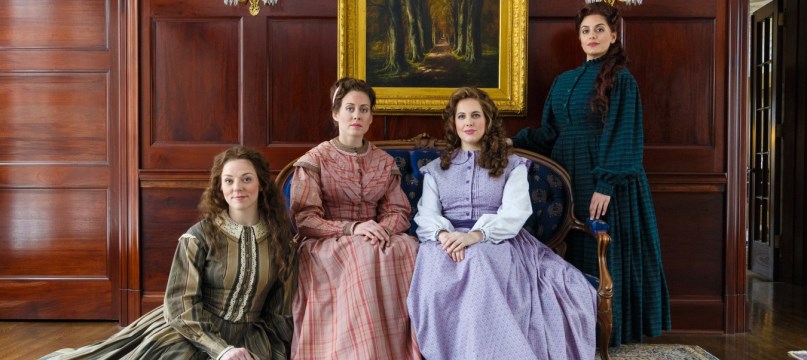Prologue
Jo is scribbling a poem in her attic when her childhood friend Laurie appears. Laurie has just married Jo’s sister Amy, and has fallen quite out of love with Jo. She claims relief and good cheer, though she is genuinely sad. Oblivious to Jo’s true feelings, Laurie proposes a return to their easy rapport of years ago. This infuriates Jo, and she mocks the very idea of trying to stop time from changing the ones she loves.
Act I
In a scene going back two years, Jo and her three sisters—Meg, Beth, and Amy—bicker as they make a game of their chores. A round of the game Truth or Fabrication reveals something about each of the sisters: Meg’s secret romance; Amy’s conflicted relationship with Laurie; Jo’s devotion to her sisters; and Beth’s insistence that she is healthy. As they go down to supper, they sing an anthem in close harmony.
Laurie taunts Jo with the secret that his tutor, John Brooke, keeps one of Meg’s gloves as a token of his love. Jo scoffs at the idea that her sister would “go filling her head with lovering rubbish.” Laurie reminds her that “Things change.” Jo starts rewriting her latest melodrama, but can’t shake the feeling that Meg may soon leave the family, and tells herself that she and her sisters remain "perfect as we are."
Meg offers to teach her suitor John Brooke a storytelling game called Rigmarole. Brooke’s story so clearly reflects his love for Meg that Jo chases him away, protesting to Meg that Brooke is too old for her. "He’s twenty-eight! He’s got one foot in the grave!"
Jo pleads with the entire family to convince Meg to rebuff Brooke. Meg retorts that rejecting him was her plan all along. Cecilia March, the girls’ glamorous aunt, sweeps in just as Brooke bluntly proposes marriage to Meg. Cecilia scorns Brooke, and this only hardens Meg’s resolve. To her own surprise, Meg pledges herself to Brooke. The family congratulates the new couple, but Jo is devastated.
Desperate, Jo accuses Meg of abandoning her. Meg placates her sister, replying, "Things change, Jo." Then she confesses her true love for Brooke, wounding Jo even more deeply.
The next summer, the family prepares for Meg’s wedding, and Meg and Brooke decide to use the wedding vows that Alma and Gideon wrote for their ceremony. As the parents teach the young couple their vows, a feverish Laurie accosts Jo, confessing his desire for her. Amy overhears the argument. Furious, Jo spurns Laurie, and he flees. Amy bursts in and accuses Jo of heartlessness, before following Laurie out. Regrouping from the episode, Jo thinks that if she gives Laurie some time he’ll change back into the friend she’s always cherished. Jo retreats to the house to write just as Beth, overwhelmed by illness, collapses.
Act II
In New York City, Dashwood, the publisher of The Daily Volcano, negotiates with Jo to purchase her latest melodrama. He offers her 25 dollars for an edited version; Jo insists on 30 dollars and two free copies. She wins her bargain.
Triumphant, Jo returns to her boarding house, and writes to her family. Meg and Brooke are now the parents of twins; Amy and Laurie are in Europe; and Beth continues to deny that her health is failing. Distracted, Jo accepts an offer of supper and the opera by a new acquaintance at her boarding house, Friedrich Bhaer.
In a split scene, Jo and Bhaer spiritedly argue points of taste in New York; in Oxford, Amy delicately asks Laurie what he feels for Jo. Meanwhile, in Concord, Beth at last acknowledges the defeat that awaits her. Jo playfully challenges Bhaer to endorse a worthier art than the melodramas she enjoys, and he recites a Goethe poem, in German. Jo asks for a translation, and Bhaer’s English rendering is a confession of love. Receiving a telegram saying that Beth has taken a turn for the worse, Jo flees to Concord.
The family keeps vigil over Beth. Dismissing the others, Beth urges Jo to accept her impending death and makes Jo promise to take care of the family. Jo accedes and they both fall asleep. When Jo awakes, Beth has died.
A few months later, Cecilia baits Jo with Amy’s latest letter, which confirms that she and Laurie are very much in love. Jo admits that she hasn’t heard from Friedrich Bhaer recently. Cecilia stuns Jo with the news that she will leave her estate to her: the endowment will render Jo independent for the rest of her life. Cecilia urges Jo to use the wealth to isolate herself from the pain that comes from loving others. Appalled, Jo rejects the offer and flees to her attic space.
Laurie enters the attic, suggesting innocently that they go back to the “perfect way it was,” but this time Jo admits that the happy old times can’t come back. Laurie leaves, and Jo calls on her memories of the sisters, and ghostlike, they materialize. In gratitude, she celebrates what they were and releases them to what they are now, before they disappear.
Unexpectedly, the attic door opens again: it’s not Laurie but Friedrich, in town by chance and eager to see her. “Is now a good moment?” he asks. “Now is all there is,” Jo realizes. She extends her hand to him as the opera concludes.
- Courtesy of the composer, freely edited





 Cast and Creative Team
Cast and Creative Team













